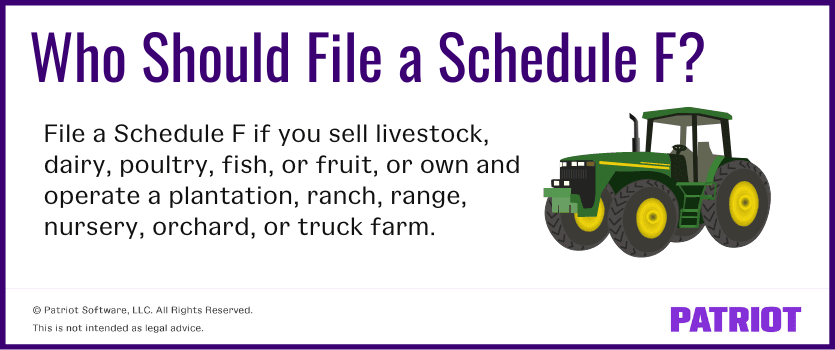If you run a farming business, calculating your profits and losses (P&L) for the year can be difficult. The good news is that the Schedule F, Profit or Loss for Farming, can help you understand your P&L. If you operate a farming business, you must file a Schedule F. But what is a schedule F tax form? Read on for the scoop.
What is a Schedule F tax form?
Schedule F, Profit or Loss from Farming, helps farming businesses calculate profits or losses for the year.
File your Schedule F with the appropriate forms:
- 1040, U.S. Individual Income Tax Return
- 1040-SR, U.S. Tax Return for Seniors
- 1040-NR, U.S. Non-resident Alien Income Tax Return
- 1041, U.S. Income Tax Return for Estates and Trusts
- 1065, U.S. Return of Partnership Income

Who should file Schedule F?
Tax form Schedule F covers several agricultural activities. So, who needs to file Schedule F? You must file a Schedule F if you are an owner or a tenant that cultivates, operates, or manages a farm for profit. A farm includes any business that sells:
- Livestock
- Dairy
- Poultry
- Fish
- Fruit
Owners and operators of plantations, ranches, ranges, nurseries, orchards, and truck farms (e.g., farms that produce vegetables for market) must also file a Schedule F.
Do not file a Schedule F to report income from:
- Veterinary, farm, or horticultural labor
- Breeding, raising, or caring for dogs, cats, or other pet animals
- Managing a farm for a fee or on a contractual basis
- Soil preparation
Instead, use Schedule C (Form 1040) to report income generated from these activities.
To report income from the sale of livestock for draft, breeding, sport, or dairy purposes, use Form 4797, Sales of Business Property.
How to complete a Schedule F
Schedule F allows you to account for income according to your accounting method. For instance, Schedule F has specific parts for cash and accrual accounting.
| Part I | Farm Income – Cash Method |
| Part II | Farm Expenses – Cash and Accrual Method |
| Part III | Farm income – Accrual Method |
Let’s look at an example of how a company can complete a Schedule F form. Fishmonger Maine is a sole proprietorship that uses the cash method of accounting and makes its income selling fish. To fill out its Schedule F, Fishmonger Maine must complete Parts I and II and leave Part III blank.
If Fishmonger Maine used the accrual method of accounting, the company would fill out Parts II and III and complete line 9 of Part I.
What deductions can you claim with Schedule F
You can claim several deductible farm expenses with Schedule F that may benefit your farming business. Deductions may include qualified expenses paid for:
- Chemicals
- Conservation
- Feed
- Fertilizers
- Gasoline and other fuel
- Hired labor
- Repairs and maintenance
- Seeds and plants
- Veterinary fees
- Rent for machinery and land
For more information, see the instructions on Form 1040 and Publication 535, Business Expenses.
Pro tip: If your farm suffered losses from a federally recognized disaster, you may be able to deduct the losses using Form 4684, Casualties and Losses. Federally recognized disasters may include damage caused by drought, tornadoes, flooding, or other extreme weather events.
Other schedules to know about
Schedule F is one of many schedules you need to know about as a farmer. There are several other schedules that may help your farming business:
- Schedule E (Form 1040), Part 1. Use Schedule E to report rental income from pastureland based on a flat charge.
- Schedule F (Form 1040), Line 8. Use Schedule F, line 8, to report income made by caring for someone else’s livestock.
- Schedule J (Form 1040). Use Schedule J to find your income tax by averaging your farm income for the previous three years. Depending on the average income tax for the last three years, you may be able to lower your income tax for the present year.
- Form 3800, General Business Credit. Use Form 3800 to claim general business credits.
- Form 4562, Depreciation and Amortization. Use Form 4562 to claim depreciation of assets used in 2021, amortization that began in 2021, or make an election under section 179 to expense certain property or report information on vehicles and other listed property.
Want your business to grow just like your farm? Patriot’s online accounting software can help you keep track of your books and grow with your business. Try it for free today!
This is not intended as legal advice; for more information, please click here.



